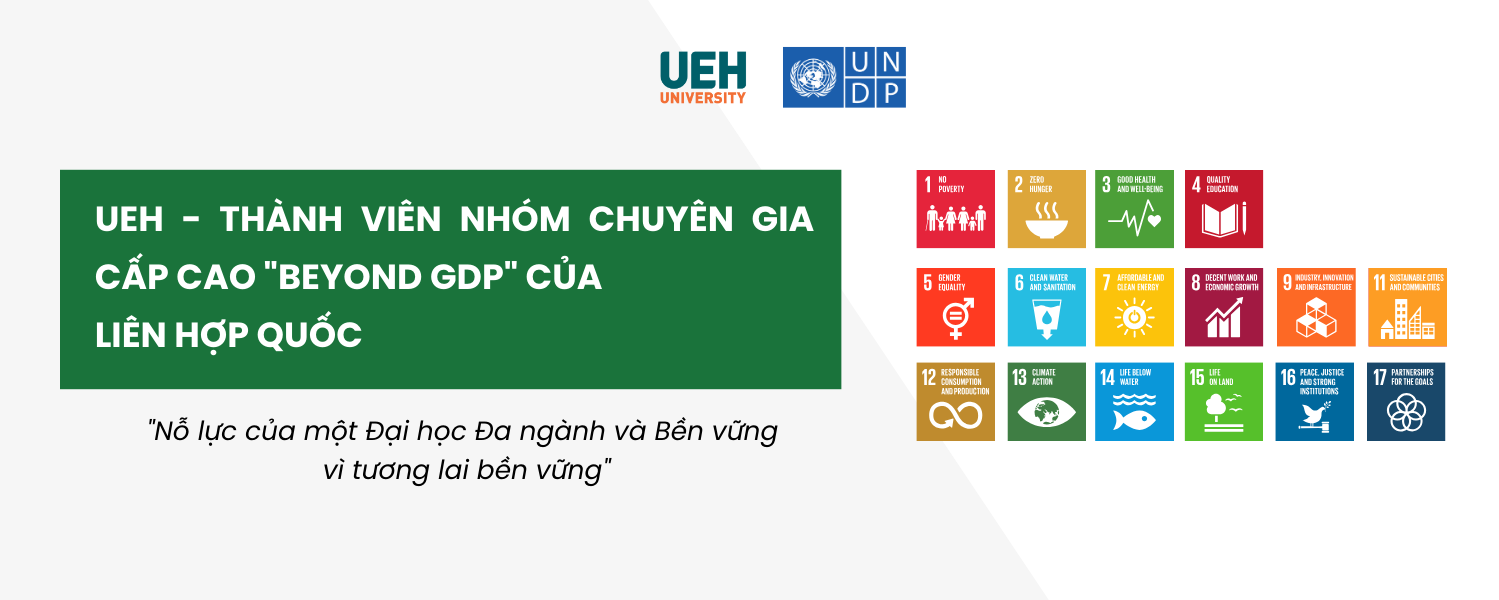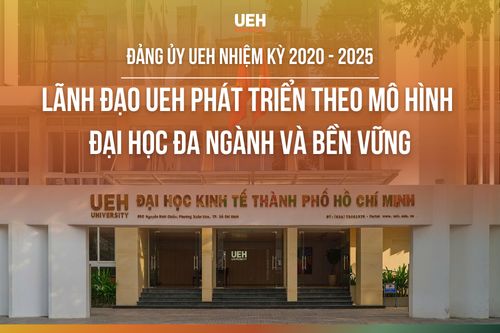
UEH Representative Appointed to United Nations High-Level Expert Group on “Beyond GDP”
09 May, 2025
On May 7, 2025, the United Nations officially announced the establishment of the independent High-Level Expert Group on “Beyond GDP,” aiming to develop new indicators that more comprehensively reflect sustainable development, going beyond traditional Gross Domestic Product (GDP) measures. This initiative stems from the commitment of member states to the “Pact for the Future” and the Sustainable Development Goals (SDGs). Among the 14 appointed experts is Associate Professor Dr. Pham Khanh Nam, representing the University of Economics Ho Chi Minh City (UEH).
When the SDGs were adopted in 2015, member states pledged to develop supplementary indicators to GDP by 2030. This commitment reflects the growing recognition that while GDP is widely used as a measure of national prosperity and a basis for setting targets and rankings, it does not adequately capture the multifaceted nature of sustainable development.
In response to this need, the UN has formed the independent High-Level Expert Group on “Beyond GDP” to advance a long-term shared objective articulated in the Pact for the Future. Speaking about this initiative, UN Secretary-General António Guterres emphasized, “Every day, we witness the consequences of failing to balance economic, social, and environmental dimensions in development. To achieve meaningful progress, we must measure what truly matters—the well-being of people and the planet. New indicators can help reorient policy to foster sustainable development for all.”
The “Beyond GDP” Expert Group includes 14 distinguished experts from diverse countries and fields, ensuring gender and geographical representation. The group is co-chaired by Mr. Kaushik Basu, former Chief Economist at the World Bank, and Professor Nora Lustig, a leading inequality scholar from Tulane University. The group will be supported by a technical secretariat composed of staff from the UN Department of Economic and Social Affairs (DESA), the UN Conference on Trade and Development (UNCTAD), the UN Development Programme (UNDP), and the Executive Office of the Secretary-General (EOSG).
Notably, UEH is honored to have Associate Professor Dr. Pham Khanh Nam, Rector, UEH - College of Economics, Law and Government, as a member of this prestigious group. The group is tasked with developing a conceptual framework and a set of globally applicable sustainable development indicators to support national policymaking. Furthermore, it will provide guidance on implementing the indicator dashboard to maximize usability, determine priorities for data collection, and strengthen statistical capacity to effectively operate the index system.
The UN Secretary-General, António Guterres, also stated that he would be sending official notifications to all Member States regarding the group's formation and inviting all UN missions to attend an information briefing on May 13, chaired by the Deputy Secretary-General.
The Expert Group will consult closely with Member States and stakeholders throughout its work, review outcomes from the UN Statistical Commission, and draw upon the global SDG indicator framework. The group's outcomes are expected to be presented at the 80th Session of the UN General Assembly, serving as a basis for subsequent intergovernmental processes.
This appointment, along with UEH’s recent designation as Vice-Chair of the SDG 11 Hub by the United Nations, is a powerful affirmation of the university’s strategy toward becoming a Multidisciplinary and Sustainable University. It also highlights the role of Vietnam and other Global South nations in shaping international discourse on sustainable development and economic transformation.
*See the United Nations announcement here.
More on UEH’s Sustainable Development Strategy:
UEH’s sustainable development strategy is comprehensively implemented across five core pillars:
Education: UEH promotes lifelong learning and Glocal (Global + Local) training through formal and short-term courses for various stakeholders, contributing to SDG 4 – Quality Education. The university equips learners with the ability to make informed, balanced, and inclusive decisions. Foundational sustainability knowledge is included as a compulsory subject across all disciplines, enabling students to understand and actively promote environmental and social change. Over the years, UEH has introduced 13 new interdisciplinary programs addressing contemporary trends and future workforce needs, including Technology and Innovation, Digital Communication and Multimedia Design, International Accounting with Professional Certification, FinTech, MarTech, Digital Business, Robotics and AI Engineering, Logistics and Supply Chain Technology, Cybersecurity, Information Technology, Computer Science, ArtTech, and Smart Automation. Nearly 100 extracurricular educational activities, competitions, discussions, and events on themes such as sustainability, environmental protection, green technology, circular economy, and sustainable cities have been organized.
Research: More than 500 research publications by UEH faculty and staff, along with hundreds of student-led research projects, address themes such as green lifestyles and the circular economy. These contribute directly to SDGs 7 (Affordable and Clean Energy), 12 (Responsible Consumption and Production), 13 (Climate Action), and 14 (Life Below Water).
Governance: Upholding the consistent principles of “Democracy – Transparency – Fairness,” UEH ensures that all members enjoy equal rights, regularly participate in decision-making, and are actively involved in institutional policies and programs. Sustainable practices are embedded in university governance and a green campus culture, contributing to SDGs 12 (Responsible Consumption and Production), 15 (Life on Land), and 16 (Peace, Justice, and Strong Institutions).
Operations: Through the UEH Green Campus project, the university has significantly reduced landfill waste by five tons through rigorous source-separation waste management. This supports circular consumption practices aligned with SDGs 12 and 15.
Community Engagement: UEH continually engages with organizations and communities focused on sustainability to collaborate on solving environmental challenges. A key initiative is the International Forum on Sustainability (IFS), which strongly supports SDG 17 – Partnerships for the Goals.
To maintain and further its commitment to sustainability and internationalization, UEH annually integrates the 17 SDGs into all institutional actions. Sustainability criteria for global universities from international rankings—QS Sustainability, THE Impact, and UI Green Metrics—are consolidated and assigned as annual Objective Key Results (OKRs) across all university units.
* Visit the UEH website to explore the university’s comprehensive initiatives in achieving all 17 SDGs.
News and photo credit: UEH - Department of Communications and Partnerships










